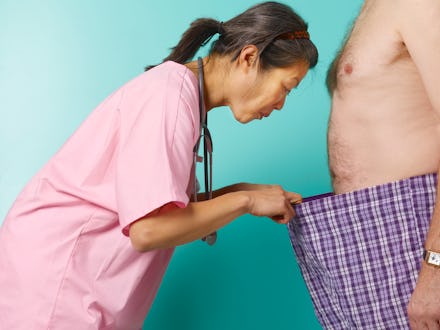Finally, the STD App Everyone's Been Waiting For

Just call it the "clap app."
Well, don't. It's actually called Healthvana and it's designed to halt the spread of sexually transmitted disease. The newly launched app lets users verify their clean bill of health (or, maybe not) to potential suitors so the second date isn't a trip to the clinic.
Founder Ramin Bastani told ABC News he's putting a digital spin on the creepy phrase "I'll show you mine if you show me yours."
"It's no different if you went to the doctor and got a printout and showed [your partner] that," he said. "We want to eradicate that idea that no news is good news."
For someone who gets tested a lot, the back and forth of having an updated health record on hand to show potential lovers can be too much of a hassle. Healthvana wants to make it easier for eligible singles to prove they're free and clear of STDs.
"If I want to go back and get my record, it is such a nightmare," Bastani told ABC News. "It's hard to get someone on the phone. And if I go back to the clinic, I wait in line for an hour-plus, just like everyone else, just to see someone and maybe get the records. And the whole time I am anxious and nervous."
Bastani said the app, developed along with the AIDS Healthcare Foundation, also eliminates the anxiety of waiting for test results. Users can instantly have their lab HIV, syphilis and gonorrhea results back from the doctors.
"We want to eradicate that idea that no news is good news," Bastani said.
Michael Kaplan, the president of charity AIDS United, told ABC News he thought the openness of sharing whether someone has an STD is a step in cutting down of those who get infected.
"What I can tell you as someone who tested HIV positive back in 1992, with clarity that I wanted my past partners to know, is that my only option back then was calling them — it wasn't even Facebook or social media," he said.
The problem: Allowing instant access to the muddled mess of health records is a benefit for everyone, but what happens if that gets in the wrong hands? Or if you lose your phone?
The app's creator claims that it follows U.S. patient privacy laws and that the data is kept on a "secure portal" with the records stored on a "secure data center" where the app's employees have access to. But after the massive Home Depot data leak of customers' credit card information, secure doesn't always mean secure.
And what about that little thing called lying? Art Caplan, head of the medical ethics department at New York University, said that tests "aren't always 100% accurate," and even when they are, plenty of things can happen in between. He added that "users have no way of knowing what someone has been up to since their last test."
Perhaps we should follow Liz Lemon's advice and avoid everyone: